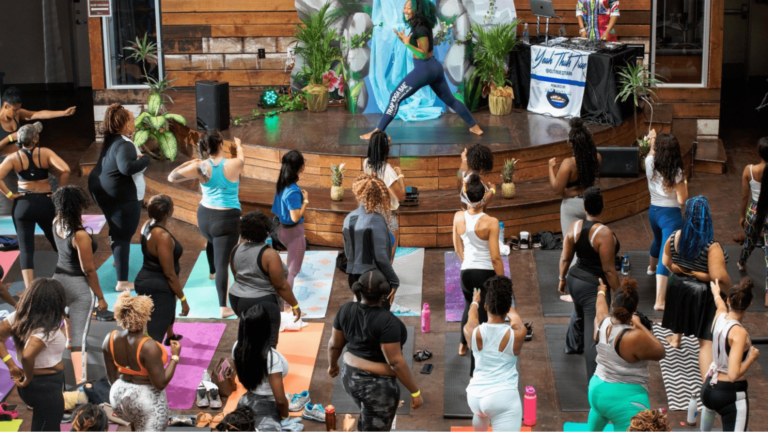We’ve all experienced events that never truly leave us.
Even now, you can still hear the music, taste the meals, and remember the laughter that made those events special.
Event planning gives you the opportunity to create those once-in-a-lifetime memories people will never forget — but where do you get started?
Here at Eventbrite, event organizing is our bread and butter. Every year, organizers from all over the world use our platform to power a whopping five million events. We want you to be next, and that’s why we’ve created this guide.
Read on to find out what event planning is, how to become an event organizer, and the steps you need to follow to plan a successful event in 2024.
Table of contents
What is the event planning process?
Ready to start planning your next event?

What is event planning?
Event planning is a big umbrella term that incorporates a wide range of different activities, roles, and responsibilities.
In its most basic form, a professional event planner is the individual responsible for the logistics of putting together and executing an event plan. That encompasses everything from venue selection and taking out event insurance to securing necessary permits, ticket sales, and customer service.
But there’s more to it than that — which is where you start pushing into the realm of event organizers and creators.
Where a lot of event planners focus on small-scale events, like weddings, or work in corporate events teams, event organizers are typically local businesses or entrepreneurs. They generally have an established brand or audience and are looking to build their community through engaging events.
Why is flawless event planning important?
Simply put, demand for event planning is sky-high right now. The market for event planning is expected to grow by 12% per year between now and 2032. Here in the US, we hosted over five times more big events than anywhere else in the world in August 2023. But it takes a lot of skill and professional know-how to plan those events and get them over the finish line.
That’s why event planning is important. Flawless event planning removes the friction from brands, venues, and entertainers, allowing them to create amazing events.
Great event planning helps you stick closely to your budget, always know what stage you’re at in the event planning process, and never miss any important steps to ensure guests get a holistic and amazing experience.
In Eventbrite’s TRNDS 2024, two-thirds of organizers said they now see their role as less about planning event logistics and more about hosting a memorable experience. At the end of the day, that’s what it’s all about — and that’s why event planning is a creative process.

Who does the event planning?
Here at Eventbrite, we love working in events because the field is so incredibly diverse. After all, event planning responsibilities can sit with many different types of professionals — and sometimes require an entire events team.
- Event planners: Event planners are responsible for laying down all the critical groundwork it takes to put on events. That means creating event plans, building event budgets, and obtaining all the necessary paperwork and permits required to stage an event.
- Event promoters: Event promoters focus on the marketing side of things and manage campaigns to make sure tickets get sold and guests are queuing at the venue on the big day.
- Event organizers: Event organizers do event planning and straddle between the roles of event planners and event promoters — effectively managing every aspect of the event process from inception to clean-up. But where organizers really differentiate themselves as professionals is in their specializations.
Biggest types of event organizers
If you’re keen to start an events business, there are different areas you can choose to specialize in.
The biggest event organizer types you’ll see in the events industry include:
- Music event organizers
- Food and drink event organizers
- Corporate event organizers
- Social event organizers
- Sports event organizers
- Nonprofit event organizers
- Virtual event organizers
But that’s just the tip of the iceberg. Each specialization has niche verticals that focus on different types of experiences.
For example:
- Music event organizers work on concerts or performances, parties, and social gatherings
- Food and drink event organizers set up classes, training, workshops, festivals, and fairs
- Business and professional event organizers work on networking events, training, workshops, talks, seminars, and meetings
- Performing and visual event organizers focus on creating concerts and performances
- Sports and fitness event organizers set up games, competitions, and exhibitions
- Charity event organizers plan festivals, fairs, galas, and other fundraisers
What skills do you need to become an event organizer?
If you want to become a successful event organizer, there are some basic event planning skills you’ll need to have (or be willing to learn).
A few of the skills you need to develop as a music events professional might be a little bit different than if you’re a wedding planner. That being said, all event organizers should have:
- Organization skills: There are a lot of strands to tie together as an events organizer.
- Multitasking skills: As an event creator, you’ll need to juggle many email threads, phone calls, and meetings.
- Communication skills: Event organizers work with a lot of vendors, entertainers, stakeholders, and venue managers, so you’ll need to demonstrate verbal and listening skills.
- Negotiation skills: If you want to get the best deals, you’ve got to learn how to negotiate. For example, it helps to know how to haggle and talk down vendors to cap prices so you can shave money off your catering budget.
- Problem-solving skills: When you’re juggling so many tasks, things don’t always run perfectly. You need to keep a cool head and put on your fixing hat.
Ready to learn more?

What training do you need to work in event planning?
You can choose to pursue a few different career pathways to work as an event planner or event organizer.
For example, you can opt to get a professional qualification.
Many colleges and universities, like NYU, offer undergraduate and postgraduate degrees to train event organizers. A college degree offers comprehensive training that combines both theoretical and hands-on experience.
But you don’t need a degree to work in event planning.
There are industry bodies like the International Live Events Association (ILEA) that offer shorter training programs and certifications designed by and for event planners to teach you all the basics.
Alternatively, you could apply for an internship with an event planning business, do some career shadowing, or register for an entry-level position with an events team to learn the ropes.
From there, you can start cultivating contacts and laying the groundwork for your own events business.

What is the event planning process?
When you’re ready to start planning major events, you’ll need to get organized — fast. That’s why we’ve put together this eight-step process.
To provide some extra insights, we’ve also included pro tips from industry experts on how to supercharge your planning to make sure your event is a clear success.
1. Frame your event around your goals
Goal-setting is an important component of event planning. Goals dictate what success will look like for your event.
Let’s say the goal of an upcoming concert is to build your brand in a new city. Your first event in town should make a statement, so you’ll want to bear that in mind when picking the neighborhood and size of the venue you want your concert to be held in.
It’s also important you decide early on how to assess your goals. Use the SMART (specific, measurable, achievable, relevant, and time-bound) goals to make it easy to understand whether you’ve achieved your goals at the end.
That means setting a timeline and milestones within your goals to ensure they’re measurable and realistic. Using analytics tools throughout to measure your progress is a smart way to keep track of your success — and that way, you’ll be able to switch up your approach if you’re off track to achieve your goals.
💡Pro tip: No matter what event goals you set, Oana Borcoman, CEO and Founder of experience agency EVOKE, says it’s worth establishing those goals before you begin the planning process.
“Why do you want to have this event? What is the purpose of it? What is the end goal of it?” she says. “Sometimes it is a vanity goal, but most of the time, we establish a clear motive and desired ROI for events before we even start planning them.”

2. Ground your event budget in reality
In our most recent TRNDS 2024, almost a third of event organizers said their top concern was budget constraints. In 2024, costs don’t seem to be moving much — so you need to create a realistic budget.
Common line items you’ll need to factor into your budget include:
- Venue hire: This will include baseline costs like venue rental or utility costs.
- Equipment hire: This will include costs like sound systems or mobile toilets.
- Event entertainment: Most bands or keynote speakers won’t show up for free!
- Catering costs: This will include the costs of bringing in a catering team or hiring food trucks.
- Event staff: Most great events take an entire team! Make sure you factor in the salaries of team members you’ll need.
- Marketing materials: This includes things like signage, banners, and event programs.
- Event insurance and permits: You’ll likely want to pay for insurance coverage, and you may also need to acquire permits to hold your event.
- Digital marketing: This includes the cost of your promotions through digital channels, like social media advertising.
- Event management software: Partnering with an all-in-one events solution will ensure your sales, ticketing, and marketing operations go smoothly.
But that’s just the tip of the iceberg. You’ll need to use an event budget template to create a comprehensive budget for your event.
💡Pro tip: Want some uplift for your event budget? Try event sponsorship.
“When executed correctly, brand sponsorship can present a myriad of benefits for both parties involved,” explains Renae Smith, founder of PR agency The Atticism.
“For brands, it offers increased visibility, association with the event’s values, and access to a targeted audience. On the other hand, event organizers gain financial support, elevated credibility, and the potential to enhance their event experience through partnerships with reputable brands.”
3. Analyze your data to identify your target audience
When planning your event, it’s essential that you understand your target audience.
Perhaps you’re targeting people from a certain part of town, a specific demographic, or people who are into a certain type of music or book genre.
Either way, look at the key demographics of your target audience — and, critically, where to find them.
Identifying your target audience is important, but don’t shortchange yourself. There are lots of different types of audiences, and a lot of events straddle different communities.
💡Pro tip: “If you’re not yet sure of your target market, delve into your analytics to find out the demographics, behaviors, and interests of your customer base, and create buyer personas,” advises Gary Cottam, CEO of digital marketing agency Doublespark.
“This way, you’ll have a better idea of who exactly will be attending your event and can streamline your marketing efforts to appeal directly to them. Using social media insights is also a great way to see who engages with your event content.”

4. Use the data you’ve collected to iron out the details
Next, it’s time to plan the essentials of your event. By “essentials,” we’re talking about event details like:
- Selecting your event location
- Choosing the right venue (if you aren’t already a venue owner)
- Selecting a date and time
- Choosing the event format
- Selecting participating vendors
- Selecting your event software partner
- Establishing and addressing staff requirements
You need to lock down most of these basics before you start promoting your event.
💡Pro tip: It’s vital you use the market research you did on your target audience to inform the time, date, and location of your event.
Let’s say you’re hosting a virtual bingo night. If you’re based on the East Coast, but you know 80% of your past attendees were on the West Coast, you should select a time for your next virtual event that takes this into consideration and caters to people living in a different time zone.
5. Find an event template to keep you on-task
Once you’ve hammered out the details of your event, it’s time to create a detailed event plan.
An event plan is your blueprint for building an amazing experience. Event plans should include all the projects within the event planning process to keep you and your event team on task.
Most event plans break things down into projects and tasks over a timeline based on how far away your event is. For example, some marketing tasks you’d want to complete six months before your event while you might publish some social media posts 48 hours before event day.
Using an event plannning template is going to make the process a lot faster and clearer.
With a template, you’ll benefit from prompts around the planning activities you’ll need to carry out and when they should be done.
For example, an event plan template breaks your operations down into key sprints that you can check off as your event date approaches. This might include tasks like creating an event page, securing your venue, creating a marketing plan, and sending out an event invitation to previous customers.
These little prompts are a fantastic way to make sure nothing falls through the cracks — especially if you’re planning a larger event than you’re used to.
💡Pro tip: Don’t commit to the first event planning template you see. There are different templates and event planning checklists for different types of events and organizers, and some plan layouts might not suit your style. Look at different types of event planning templates and how they’re set up before you start populating them.
6. Choose an all-in-one software solution to manage your event
It doesn’t matter whether you’re planning in-person events, hybrid events, or virtual events: You’ll need event management software.
An all-in-one event management solution should include features like:
- Creating a custom event page
- Creating and selling tickets
- Creating custom forms to collect meaningful data about your registrants
- Creating custom seating plans for your venue
- Marketing your event
- Communicating with guests
- Reporting on your event
Create a wish list of software features you think you need for your event, and put that to event registration software providers.
💡Pro tip: By choosing Eventbrite, you’ll also get an added bonus for in-person and hybrid events: the Eventbrite Organizer App.
“I’ve personally used the mobile app before, and it’s great for seamlessly checking in attendees,” says Amanda Crawford, Senior Product Marketing Manager at Eventbrite.
“It’s also beneficial because it provides a real-time count of checked-in individuals, giving you the confidence to start your session/event when enough people have arrived.”
7. Choose the right channels to promote your event
Next, it’s time to get the word out about your event. This starts by establishing your event marketing budget, using your market research to choose the sales channels your target audience engages with, and then developing content that resonates with them.
That’s where a platform like Eventbrite Marketing Tools can help you go the extra mile.
With Eventbrite Marketing Tools, you get access to AI-generated copy, which you can A/B test on various social media channels to find out which combinations perform the best.
That can help you save lots of time and money by enabling you to put cash behind posts that you know are proven to generate clicks and sell tickets. You can also use Eventbrite to set up retargeting campaigns so that people who visit your event page but don’t end up buying tickets will see your ads later on social.
You can even sell your event tickets directly on Facebook to save your target audience from clicking through to a different site.
💡Pro tip: According to Ava-May Rooney, PR Executive at Encore Musicians, using data to optimize your ad campaigns is essential to make sure your content gets in front of the right eyes.
“Targeting your audience and optimizing ad spend requires data-driven strategies. Use analytics tools to monitor the performance of your marketing campaigns,” she says.
“Adjust your budget allocation based on which channels and tactics are driving the best results, ensuring you’re getting the most value from your advertising spend.”
8. Use your event data to make your next event even better
This step is often neglected. After your event, look at the hard numbers to compare your event’s results against your original event goals.
For example, you can use sales data to look at the success of your marketing campaigns, attendance data to determine the success of your warmer campaigns, or VIP package sales to understand whether you had the right pricing strategy.
You can then use those reports to share your success with stakeholders and communicate things with your team — but this data is also critical in helping you make your next event better.
💡Pro tip: Want to see which of your marketing channels generated the most hits? Use Eventbrite’s traffic and conversion reporting tools to assess where most of your sales leads came from. This will enable you to decide where promoting your event page worked (and where it didn’t).
What is event planning going to be for you?
If you want to start planning events (or take your event creation to the next level), 2024 is the perfect time to do it. Demand is high, and people want memorable experiences to share with one another.
As an event organizer, you’ve got to cover all your bases to make sure you’re able to deliver those experiences — and Eventbrite is here to help.
By partnering with Eventbrite, you’ll get access to the organizational tools, operational tools, marketing tools, and data you need to establish a successful events business. Let’s make 2024 your year.






